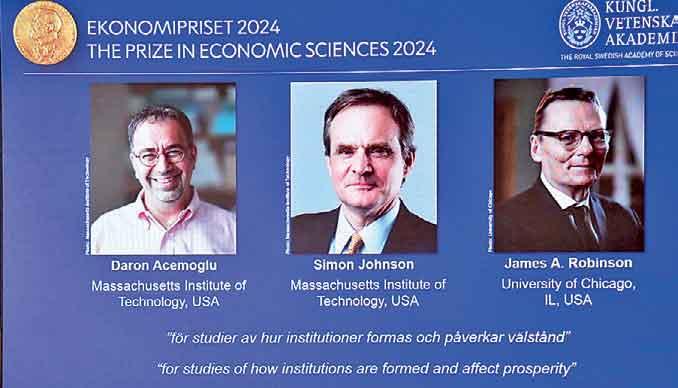Reply To:
Name - Reply Comment

REUTERS: Three U.S.-based academics won the 2024 Nobel economics prize on Monday for research that explored the aftermath of colonisation to understand why global inequality persists today, especially in countries dogged by corruption and dictatorship.
Simon Johnson and James Robinson, both British-American and Turkish-American Daron Acemoglu were commended for their work on “how institutions are formed and affect prosperity”, the Royal Swedish Academy of Sciences said.
“Reducing the vast differences in income between countries is one of our time’s greatest challenges,” said Jakob Svensson, Chair of the Committee for the Prize in Economic Sciences.
“They have identified the historical roots of the weak institutional environments that characterise many low-income countries today,” he told a press conference.
The award came a day after a World Bank report showed that the world’s 26 poorest countries - home to 40 percent of its most poverty-stricken people - are more in debt than at any time since 2006, highlighting a major reversal in the fight against poverty.
The prestigious award, formally known as the Sveriges Riksbank Prize in Economic Sciences in Memory of Alfred Nobel, is the final prize to be given out this year and is worth 11 million Swedish crowns (US $ 1.1 million).
Acemoglu told reporters in Athens that data gathered by pro-democracy groups showed that public institutions and rule of law in many parts of the world were currently being weakened. “Authoritarian growth is often more unstable and doesn’t generally lead to very rapid and original innovation,” he said, referring to China as “a bit of a challenge”.
Johnson told Reuters by telephone that established institutions in the United States were under stress, notably due to Donald Trump’s refusal to acknowledge he lost the 2020 election.
“I think that’s the biggest concern that I see in the industrialised world,” he said, adding the November 5 presidential election was “a serious stress test” for U.S. democracy.
Acemoglu and Johnson work at the Massachusetts Institute of Technology, while Robinson is at the University of Chicago, where he spoke at a press conference on Monday and referred to his co-laureates as his “best friends”.
“I’m not someone who thinks that economists have a kind of cure for everything or they have some silver bullet,” he said.
“Ideas are important in terms of giving people levers or giving people ways to think about the problems in their society.”
He said all humans have the same aspirations and a shared history but have nonetheless “built very different societies in different parts of the world”.
“The first thing is to think about a question that’s relevant to those people, to their context and to their aspirations,” he said of his research.